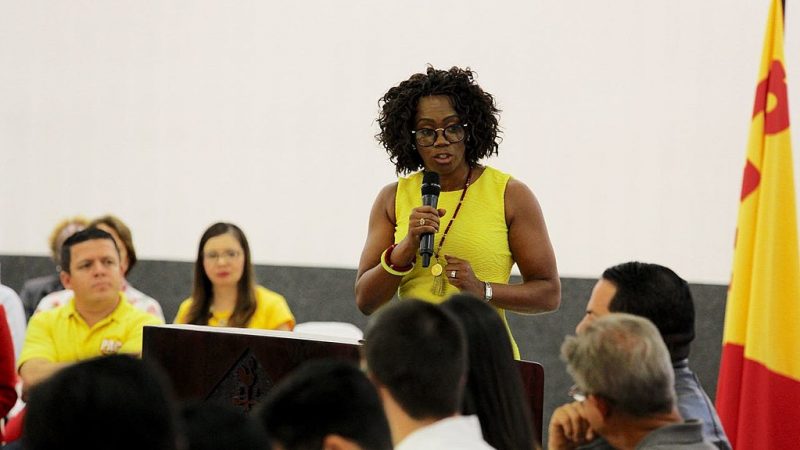
Epsy Campbell Barr during her campaign in the 2018 elections as candidate for the vice presidency of the Republic of Costa Rica. Photograph by MadriCR, shared under a Creative Commons license (Attribution-Share Alike 4.0 International).
The final weeks before the Costa Rican presidential elections kept many on the edge of their seats. In the second round of votes there were two candidates with a gulf of differences: Carlos Alvarado of the Citizen Action Party (a party already in power) and Fabricio Alvarado of the National Restoration Party.
Of the two candidates, Fabricio Alvarado alarmed human rights activists and the lesbian, gay, bisexual, transgender, queer and intersex (LGBTQI) community by rejecting to defend the rights of sexual and gender minorities and promising a government that would support the “fundamental values of Costa Rica” which included a traditional vision of the family and the ideals of evangelical Christianity.
However, Carlos Alvarado came out on top. His victory caused celebrations that extended beyond Costa Rica because his vice presidential running mate was Epsy Campbell Barr, an economist by profession and activist for the rights of the Afro-descendant people.
That means Campbell Barr is now the first Afro-descendant woman vice president in not only Costa Rica, but the Americas.
The demonstrations of support have been massive, especially from Latin American Afro-descendant movements, who see Campbell Barr as an important triumph in the fight to access spaces of power and create policies of inclusion for people of African descent, who make up about 30% of the population on the continent.
“Invisible” discrimination, global struggles
Racism is prevalent in Latin America, but the ways in which it is structured have evolved over the years and aren't always obvious. Creating awareness of these systems and their consequences is part of the work of a large number of activist groups and human rights defense associations.
In this regard, Argentine media organization Emergentes highlighted the importance of Afro-descendant communities having government representation and discussed Campbell Barr's victory in relation to the death of Winnie Mandela, a well-known South African anti-apartheid activist.
Emergentes reported testimonies from different figures (including one of the authors of this article) as well as recent incidents of racism that have been given coverage by the media, to emphasize the global and complex nature of the problem:
…flagelos como la segregación, racismo y discriminación si bien no se muestran en las formas antiguamente conocidas, ahora mutaron y se diversificaron, adoptando posturas modernas que no distinguen entre sus practicantes a grandes o chicos.
… scourges such as segregation, racism and discrimination, although they are not visible in the old-fashioned ways, have now mutated and diversified, adopting modern positionings that do not distinguish between their practitioners, big or small.
In the article, Jenniffer Mayren Urrutia Briñez, an international publicist and the founder of A-fro, a news and lifestyle site aimed at Afro-descendant readers, pointed out the great impact that Campbell Barr's election as vice president has had:
Ha sido un camino difícil para la comunidad afrolatinoamericana para abrirse espacio en la política, así que el hecho de que una mujer afrodescendiente llegue a ocupar este cargo, se ha convertido hoy en día en un hecho inolvidable
It has been a difficult path for the Afro-Latin American community to open up space in politics, so the fact that a woman of African descent reached this position, has now become an unforgettable event.
She continued:
Este momento lo estamos esperando hace mucho, ya que es una forma de reivindicar no sólo a la comunidad negra costarricense, sino a toda la comunidad negra de América Latina. Es la forma de visibilizar nuestra existencia, las raíces afrodescendientes, la multietnicidad y multiculturalidad que existe en nuestros países, además de la importancia de la valoración a nuestra contribución en este continente.
We have been waiting for this moment for a long time, since it is a way of reclaiming not only the Costa Rican black community, but the entire black community of Latin America. It is the way to make visible our existence, the Afro-descendant roots, the multiethnicity and multiculturalism that exist in our countries, besides the importance of valuing our contribution on this continent.
On Twitter, academic Cristina Burneo agreed with the importance of linking Campbell Barr's election with other places in the region in which activism, public service and the struggle for people of African descent have had tragic losses, such as in Brazil and Ecuador:
En Brasil, asesinaron a Marielle Franco. En Ecuador, asesinaron a Gavis Moreno. En Costa Rica, gana Epsy Campbell Barr. Las mujeres afro vivas hoy honran la memoria de las mujeres asesinadas.
— ? cristina burneo s. (@cristinaburneos) April 2, 2018
In Brazil, they murdered [human rights activist] Marielle Franco. In Ecuador, they murdered [women's prison director] Gavis Moreno. In Costa Rica, Epsy Campbell Barr wins. Afro-descendant women living today honor the memory of the murdered women.






